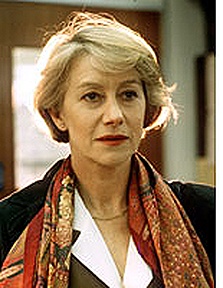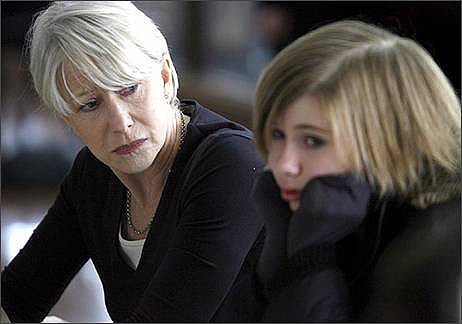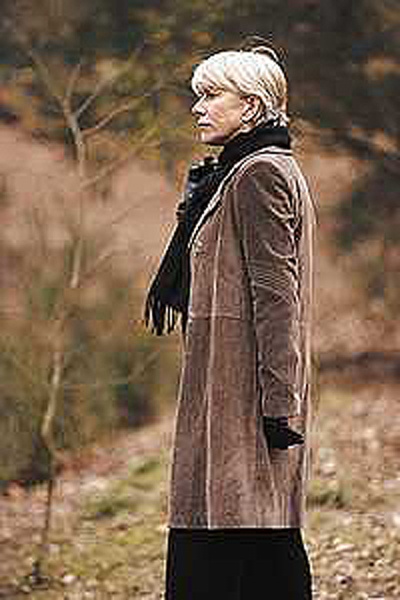Prime Suspect on PBS
Helen Mirren's Masterpiece Theatre in Every Sense
By: Charles Giuliano - Nov 15, 2006

Helen Mirren stars as DSI Jane Tennison.

Searching the heath for clues to the missing girl Sallie.

Tennison befriends the teenager Penny.

Tennison searching for evidence.

Of all the forumlaic cop shows on TV from such franchises as "Law and Order" to the spins of "CSI" Helen Mirren as DSI, Detective Superintendent Jane Tennison, stands apart. After a decade long hiatus she has returned to PBS with "Prime Suspect 7 the Final Act." The series started in 1991 and she abandoned it with concerns that it would loose its originality and edge. But fans clamored for more while she went on to other projects such as the award winning "Elizabeth," also on PBS, and the superb film "The Queen" which seems destined to win her the Oscar for Best Actress that she has long deserved.
As PBS likes to describe itself "The best television on television" for 90 minutes last Sunday night, and concluding this Sunday evening, that was richly and abundantly true in every sense. From the very first moment of the performance that took Mirren a decade to return to we were positively riveted to ease our way back into the brilliant mind and deeply conflicted personal life of Tennison. Now a decade on we find her in disarray drowning troubles in the bottle but struggling to keep her wits together, just months before retirement, to solve yet another tough case. While she can brilliantly sort out the facts and details of a crime she appears completely unable to find meaning and substance in a numbingly lonely personal life.
The empty refrigerator in her flat stands as a signifier of the lack of depth and meaning of her private life. Stumbling awake with a hangover and trying to sort out the lost details of the night before and a bruise on her forehead she opens the fridge looking for a mixer for a hair of the dog bracer of vodka, the colorless, odorless, drinking person's drink when getting straight to show up in the office with a ton of backup breath mints. But it appears that nobody is deceived from the peers and colleagues who offer her straight talk and tough love to the "Lads" who worship and respect her as the "Guv," to a boss who goes ballistic, and asks for an immediate resignation when it becomes apparent that she was visibly drunk while interrogating a suspect. Tennison pleads with him that "I have a real feel for this case and let me get the bastard." Reluctantly he agrees but warns that she will be on a short leash.
Add to that a father near death and an estranged sister to fight with. We see her torn between the bedside vigil of the father who dies and a search for the body of the missing girl. So death pervades this drama which skillfully contrasts her private loss with public responsibility to find a killer. Tennison is out of control but following harsh advice mandated by a boss staggers into her first AA meeting. There to encounter a former associate who confesses that he had resented having a female boss and took steps to undermine her. It's old business for him but AA stipulates as a part of recovery that one apologize to past victims. They form an odd and touching friendship as former adversaries now united to fight a greater demon within.
Oh yes and there is a crime to solve. A teenager gone missing and then discovered dead on the heath. There is a suitable range of suspects such as the black hip hopper whom "all the girls love," to a coach who is too affectionate in a hug captured on video, or Tony the distraught father who has unexplained lapses in his timetable on the evening of the crime. When asked for a DNA sample he provides it by spitting in Tennison's face.
No doubt in the concluding episode to be aired this Sunday Tennison will once again solve the murder of Sallie. But it seems almost incidental to the greater mystery of just how Tennison will bring order and closure to her life and ease off into retirement with years of damage control laying ahead. For the past 35 years she pursued one of the toughest professions imaginable. It left her shattered and isolated. There was the stunning contrast of having so much power and authority on the job and utter despair when not working. There is absolutely no balance between public and private life. Her only companion a bottomless bottle with not even a stray cat to call a friend. Which perhaps explains her poignant and unprofessional bond with Penny a teenager who has insights and perhaps an even greater role in the crime. Tennison sees so much of herself in the young girl. Befriending Penny is a way to unravel how and when her own life veered off course.
In interviews Mirren long expressed the concern that her character Tennison had overstayed its welcome. That with familiarity the public would tire of the detective. And that it was important to move on. Thankfully, she has provided us with this memorable curtain call. Often without makeup and looking all too much her age (born July 26, 1945) she has truly bared her soul. Rarely has there been a more courageous or shattering performance. It leaves little doubt that she is the greatest actress of her generation and that this is her finest work.





